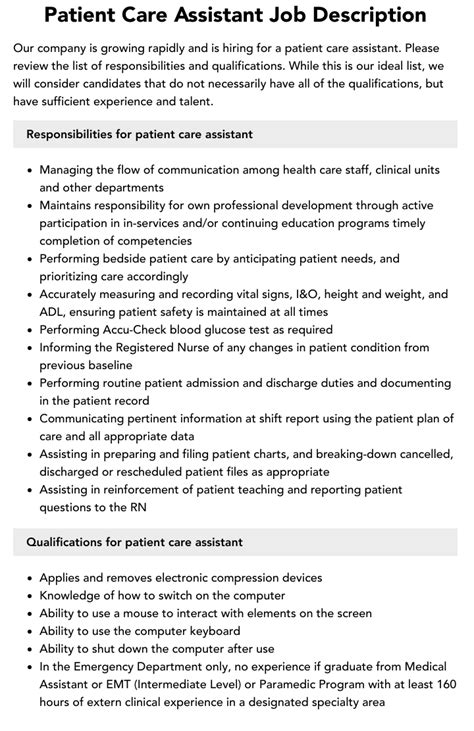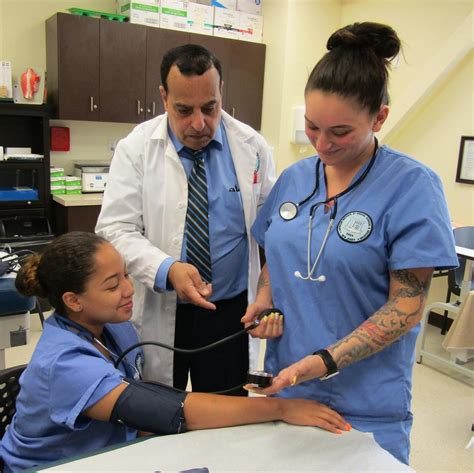Intro
Discover the vital role of a Patient Care Assistant in healthcare settings. Learn about the job description, responsibilities, and skills required to provide exceptional patient care, including vital sign monitoring, medication administration, and patient communication. Explore the daily tasks and duties of a PCA and how they support nurses and healthcare teams.
As the healthcare industry continues to grow and evolve, the role of patient care assistants has become increasingly important. These dedicated professionals play a vital part in ensuring that patients receive high-quality care and support during their hospital stays or visits to healthcare facilities. In this article, we will delve into the patient care assistant job description and responsibilities, highlighting the key aspects of this rewarding career.
The demand for patient care assistants is on the rise, driven by an aging population and an increased focus on patient-centered care. As a result, healthcare providers are looking for skilled and compassionate individuals to fill these roles. If you are considering a career as a patient care assistant, it's essential to understand the job description and responsibilities to determine if this is the right path for you.
What is a Patient Care Assistant?

A patient care assistant, also known as a patient care technician or nursing assistant, is a healthcare professional who provides direct patient care under the supervision of a licensed nurse or physician. Their primary goal is to ensure that patients receive exceptional care, support, and comfort during their hospital stays or visits to healthcare facilities.
Key Responsibilities of a Patient Care Assistant

The responsibilities of a patient care assistant can vary depending on the healthcare facility, patient needs, and specific job requirements. However, some common responsibilities include:
- Vital Sign Collection: Patient care assistants collect vital signs, such as temperature, pulse, blood pressure, and oxygen saturation, to monitor patients' conditions and report any changes to the nursing staff.
- Patient Hygiene and Comfort: They assist patients with bathing, dressing, and grooming, ensuring their dignity and comfort are maintained at all times.
- Mobility and Transfer: Patient care assistants help patients with mobility and transfer, such as walking, turning, and repositioning, to prevent pressure ulcers and promote independence.
- Nutrition and Hydration: They assist patients with eating, drinking, and feeding, ensuring they receive adequate nutrition and hydration to support their recovery.
- Wound Care and Dressing: Patient care assistants assist with wound care and dressing, applying topical treatments, and monitoring wound healing.
- Communication and Observation: They communicate effectively with patients, families, and healthcare staff, observing and reporting any changes in patients' conditions or concerns.
- Documentation and Record-Keeping: Patient care assistants maintain accurate and up-to-date records of patients' care, including vital signs, treatments, and progress.
Skills and Qualities Required for a Patient Care Assistant

To be successful as a patient care assistant, you should possess the following skills and qualities:
- Compassion and Empathy: Patient care assistants must be compassionate and empathetic, providing emotional support and comfort to patients and families.
- Communication Skills: Effective communication is critical in this role, as patient care assistants must communicate clearly with patients, families, and healthcare staff.
- Attention to Detail: They must be detail-oriented, accurately collecting vital signs, documenting patient information, and reporting any changes or concerns.
- Physical Stamina: Patient care assistants must be physically fit, as they may be required to lift, transfer, and reposition patients.
- Teamwork and Collaboration: They must work collaboratively with healthcare staff, including nurses, physicians, and other patient care assistants, to provide comprehensive care.
- Adaptability and Flexibility: Patient care assistants must be adaptable and flexible, responding to changing patient needs and priorities.
Education and Training Requirements

The education and training requirements for patient care assistants vary depending on the employer, state, or country. However, most patient care assistants complete a post-secondary certificate or diploma program in patient care assisting, which typically includes:
- Classroom Instruction: Students learn about patient care principles, anatomy, physiology, and medical terminology.
- Clinical Training: They participate in clinical training, gaining hands-on experience in patient care settings.
- Certification: Many patient care assistants obtain certification, such as the Certified Nursing Assistant (CNA) or Certified Patient Care Assistant (CPCA) credential, to demonstrate their competence and commitment to the profession.
Career Advancement Opportunities

Patient care assistants can pursue various career advancement opportunities, including:
- Nursing Education: They can pursue nursing education, becoming licensed practical nurses (LPNs) or registered nurses (RNs).
- Specialized Roles: Patient care assistants can specialize in specific areas, such as pediatrics, gerontology, or hospice care.
- Leadership Roles: With experience and additional education, they can move into leadership roles, such as charge nurse or patient care coordinator.
- Healthcare Management: Patient care assistants can transition into healthcare management, overseeing patient care services or departments.
Conclusion
A career as a patient care assistant can be highly rewarding, offering the opportunity to make a positive impact on patients' lives. By understanding the patient care assistant job description and responsibilities, you can determine if this career path aligns with your skills, interests, and values. If you are passionate about delivering exceptional patient care and supporting the healthcare team, consider pursuing a career as a patient care assistant.
What is the primary role of a patient care assistant?
+The primary role of a patient care assistant is to provide direct patient care under the supervision of a licensed nurse or physician, ensuring that patients receive exceptional care, support, and comfort during their hospital stays or visits to healthcare facilities.
What skills and qualities are required for a patient care assistant?
+Patient care assistants must possess compassion, empathy, effective communication skills, attention to detail, physical stamina, teamwork and collaboration skills, and adaptability and flexibility.
What education and training are required for a patient care assistant?
+Patient care assistants typically complete a post-secondary certificate or diploma program in patient care assisting, which includes classroom instruction and clinical training. Certification, such as the Certified Nursing Assistant (CNA) or Certified Patient Care Assistant (CPCA) credential, is also recommended.
